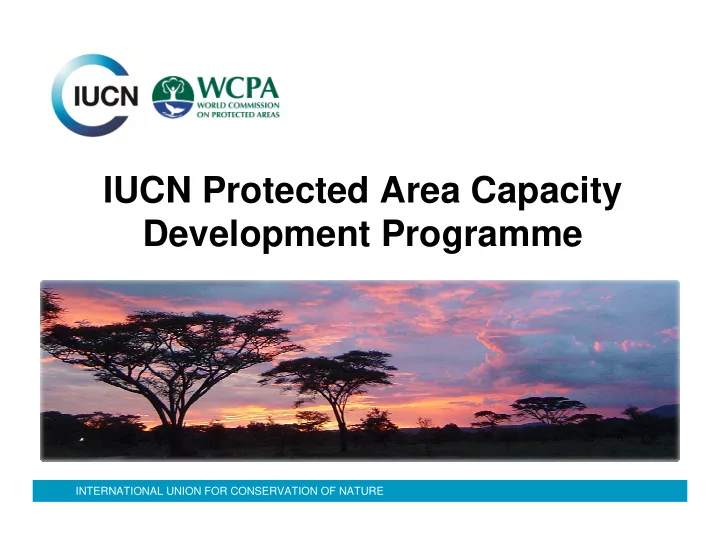

IUCN Protected Area Capacity Development Programme INTERNATIONAL UNION FOR CONSERVATION OF NATURE
Objectives � Deliver Technical Support to National Governments to meet their PA Objectives � Support SCBD with Technical Guidance to implement the Programme of Work on PAs, Aichi Target 11 and other Biodiversity targets of the Strategic Plan related to PAs 2
Components of Protected Area Capacity Development Programme • Knowledge Products • Education and Training • Expertise 3
Knowledge Products � Books � Journals such as Parks � Best Practice Guidelines � Technical briefs � Translations � E-Book on Managing Protected Areas 4
Knowledge Products Best Practice Protected Area Guidelines � 17 BP PA Guidelines � Series being updated � In production – Restoration, Conservation Planning, Invasive Alien Species, Urban PA Management, Tourism � More Planned – Climate, Private Protected Areas others 5
Knowledge Products E- Book on Managing Protected Areas Objective: To provide to the world’s protected area management students and professional managers the best training text book available as a free compendium E-Book by 2014 and to make it available in all three of IUCN’s official languages. Modeled after the 2006 publication, “Managing Protected Areas – A Global Guide. Graeme Worboys, lead. 6
Knowledge Products Management Categories � Guidelines for applying IUCN Protected Area Management Categories � Guidelines for applying IUCN Protected Area Management Categories to Marine Protected Areas – due to come out in 2012 at the World Conservation Congress 7
Education and Training Core Competencies at: •Field Operations - Rangers •Site Management- PA Managers •Strategy, policy and planning- Directors and regional managers Curriculum Development Accreditation Mentorship 8
Expertise Objective: Countries will have access to a recognized experts for consulting or training � Commission Experts WCPA, CEC, SSC, etc. � Protected Area System Experts from Member Countries 9
IUCN Contacts David Reynolds, Senior Advisor, Protected Areas Capacity Development Programme GPAP, IUCN David.Reynolds@iucn.org Jose Courrau, Coordinator, Environmental Policy and Mgt., IUCN Regional Office for Meso America- Caribbean Initiative, San Jose, Costa Rica Jose.Courrau@iucn.org 10
Dutch Caribbean Nature Alliance (DCNA) Jamaica Conservation and Development Trust CARMABI National Environment & Planning Agency Bahamas National Trust Negril Chamber of Commerce Fundación Antonio Núñez Jiménez de la Environmental Foundation of Jamaica ( EFJ ) Naturaleza y el Hombre Jamaica Environment Trust ProNATURALEZA Department of Physical Planning Natural Secretaría de Estado de Medio Ambiente y Resources and Environment Recursos Naturales St Lucia National Trust Fundación para el Mejoramiento Humano - The Trust for Sustainable Livelihoods PROGRESSIO Caribbean Natural Resources Institute (CANARI) Grupo Jaragua Centre for Resource Management and Fundación Global Democracia y Desarrollo, Inc. Environmental Studies (CERMES) (FUNGLODE) Fideicomiso de Conservación de Puerto Rico Consorcio Ambiental Dominicano National Parks Trust of the Virgin Islands Fundación Sur Futuro, Inc. Centro para la Conservación y Ecodesarrollo de la Bahía de Samaná y su Entorno (CEBSE) Fondation pour la Protection de la Biodiversité Marine
Key actors and partners (regionally and nationally) � National agencies of protected areas � CARICOM (http://www.caricom.org/ ) � UNEP- CEP � TNC – The Caribbean Challenge (http://www.nature.org/ourinitiatives/regions/caribbean/caribbean- challenge.xml ) (www.caribbeanchallenge.org ) � University of West Indies (http://www.uwi.edu/ ) � OECS (http://www.oecs.org/ ) � UNESCO – Havana office (http://www.unesco.org/new/es/havana/home/ ) � Global Island Partnership (GLISPA) (http://www.cbd.int/island/glispa.shtml ) � CANARI (http://www.canari.org/ ) � Caribbean Marine Protected Area Management Network and Forum (CaMPAM) (http://campam.gcfi.org/campam.php ) � Caribbean Research and Management of Biodiversity (CARMABI) (http://www.carmabi.org/ ) � UNDP-Regional Office and Country Offices
Key existing and/or proposed regional and sub-regional training centers � University of West Indies (http://www.uwi.edu/ ) � CaMPAM (http://campam.gcfi.org/campam.php ) � University of the Netherlands Antilles (http://www.una.an/ ) � CATIE (www.catie.ac.cr/ ) � CARMABI (http://www.carmabi.org/ ) � ELAP (http://www.uci.ac.cr/ )
Existing projects, both from IUCN and IUCN members and partners � Regional (Antigua And Barbuda, Dominica, Grenada, St. Kitts And Nevis, St. Lucia, St. Vincent and Grenadines): OECS - Protected Areas and Associated Sustainable Livelihoods (GEF-World Bank) � Regional (Antigua and Barbuda, Grenada, St. Kitts and Nevis, St. Lucia, St. Vincent and Grenadines): Sustainable Financing and Management of Eastern Caribbean Marine Ecosystems (GEF-World Bank) � Bahamas - Building a Sustainable National Marine Protected Area Network (GEF-UNEP) � Dominican Republic - Re-engineering the National Protected Area System in Order to Achieve Financial Sustainability (GEF-UNDP) � Haiti - Establishing a Financially Sustainable National Protected Areas System (GEF-UNDP) � Jamaica - Strengthening the Operational and Financial Sustainability of the National Protected Area System (GEF-UNDP) � Cuba - Strengthening the National System of Protected Areas (GEF-UNDP) � Cuba - Application of a Regional Approach to the Management of Marine and Coastal Protected Areas in Cuba's Southern Archipelagos (GEF-UNDP) � Cuba – Agricultural Biodiversity Conservation and Man and Biosphere Reserves in Cuba: Bridging Managed and Natural Landscapes (GEF-UNEP)
Key countries where IUCN have strong working relationships and/or on-going activities � Dominican Republic � Saint Lucia � Netherland Antilles � Cuba � Bahamas � Jamaica � Haiti � Saint Kitts and Nevis � Trinidad and Tobago � Puerto Rico
Recommend
More recommend